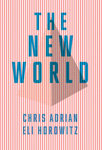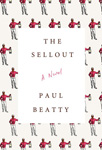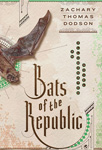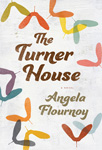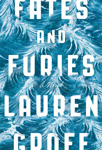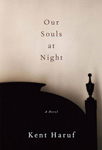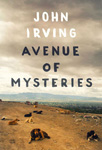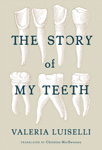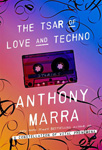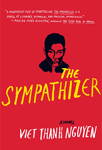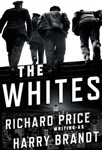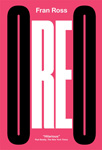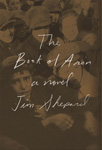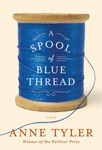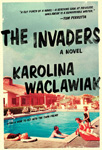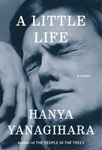by Chris Adrian and Eli Horowitz
Buy it at Powell’s »Wendy: The first book up for consideration is A Spool of Blue Thread by Anne Tyler. The book tells the story of the Whitshanks, a Baltimore family, revealing the secrets and trials of various family members as the book jumps around in chronological time. If there’s a main character here, it’s Abby Whitshank, the matriarch. Her geriatric memory loss precipitates a crisis in the family, but there are also many peripheral narratives.
Kelvin: The other book is John Irving’s Avenue of Mysteries, a dual narrative that cuts between a Mexican-American author’s journey to the Philippines and his childhood memories of growing up in a garbage dump in Oaxaca, Mexico. The book addresses, among other themes, Catholic iconography, Latin American poverty, gay and transgender repression, literary integrity, and mortality (both artistic and corporeal).
Wendy: So, these books were an interesting pair. I feel like if I were at an airport in the ’90s, there would definitely be an Anne Tyler book and a John Irving book sitting side by side in the airport bookstore, competing for my attention.
Kelvin: So this is the Nineties Airport Round.
Lizzie: It’s also the round that pits two writers seemingly presenting themselves as thinly veiled versions of themselves within their novels as they discuss their own mortality.
Wendy: So this is the Two Writers Presenting Themselves as Thinly Veiled Versions of Themselves Within Their Novels as They Discuss Their Own Mortality: Subdivision, Nineties Airport Round.
Lizzie: When my books arrived and I tore myself away from the Vanderpump Rules marathon that was on and began this journey—I’m kidding guys, I just love using the word “journey”—I was really, REALLY surprised that Avenue of Mysteries didn’t turn out to be my favorite book of the two. People always say, “Don’t judge a book by its cover,” but let’s get real. One cover was a big blue spool of thread (spoiler alert) and the other was a bunch of dogs and the promise of a mystery. I was sure I’d like the mystery dog book better, but boy was I wrong! Hey, maybe that phrase really is true!
Wendy: Yes, covers or no, we all did find ourselves in violent agreement as to which book was the winner. We all liked the Tyler book and severely did not like Irving’s book. I know my verdict will come as no surprise to you guys since I did almost nothing but text you over our work vacation to tell you how much I did not like this book. I believe I even said I was going to drive across the country in astronaut diapers to confront John Irving. Who wants to take the first swing?
Kelvin: I’ll go! For me, the most interesting facet of this pairing of books was the issue of cultural appropriation. In short, Anne Tyler is working (presumably) within a reasonable wheelhouse of her own authentic life experience. Meanwhile, John Irving is stepping out of his comfort zone into a more exotic milieu, at his own risk of coming off as disingenuous and—to be honest—patronizing.
To be clear, I am not one to take the stance that Paul Simon is not allowed to be influenced by African music, or that Quentin Tarantino is not allowed to make a movie about Japanese samurai. I absolutely believe artists have the license to venture into unknown waters and that (sometimes) the world is better for it. The problem for me was a question of fetish. Irving’s Mexico was so marinated in North American perceptions of Latin-psycho-magic-sexual-mysticism, I started to wonder where we draw the line between homage and objectification. There was an intellectually disabled girl who was clairvoyant, a cleaning lady who was also a prostitute, and a freak show that involved prepubescent Mexican girls with budding breasts. All of this circulated around an impotent writer who lives in the space between his own professional nostalgia and his current geriatric mania.
Wendy: Exactly! First Irving creates a character who is actually a cleaning lady and a prostitute and then a few pages later, the character Lupe says of the Virgin Guadalupe, “Guadalupe has been corrupted by the Catholics. She was our Virgin … they made her the Virgin Mary’s dark-skinned servant. They might as well have called her Mary’s slave—maybe Mary’s cleaning woman!” It makes your head spin. It would be one thing if this was all intentional, some kind of comment on something, but there’s just too much messy plot and too much overwriting for that to possibly be true. I’ve read and even liked a bunch of books that are essentially stories about dying white-manhood—J.M. Coetzee’s Disgrace comes to mind—but this one is not good. It’s just not good. Coetzee was turning a white hot spotlight on a white man’s entitlement whereas Irving tries to justify entitlement by hiding himself behind the character of Juan Diego.
I agree with you, Kelvin, that there’s nothing essentially wrong about writing outside of your experience. I, Claudius wasn’t written by motherfucking Claudius, but if you are going to take on another culture in this day and age like, oh, say, an aging Oaxacan man who grew up in a dump, you better fucking nail it.
Lizzie: When all was said and done, I also found that I never truly believed that the young Juan Diego and the older Juan Diego were one and the same (the narrative jumps frequently between the past and the present) and in fact at no point during Irving’s book did I feel like I truly connected with any idea or person depicted within it. I found myself forgetting who characters were (never a good sign) and getting completely lost in the plot. I was reading words upon words and it felt like a chore. Neither Juan Diego, neither the Mexican book-saving boy nor the Midwestern aging writer, compelled me to read on, though I did.
Wendy: Right, whereas in Thread, the, uh, thread between the characters and their past selves seemed very present. Abby-in-her-20s was as real as aging, dementia-ridden Abby. It was just better writing.
Kelvin: At the end of the day, you can feel that Anne Tyler cares about her characters. Each one felt loved and crafted. At its most zoomed-out, A Spool of Blue Thread comments on American families: the generational missed connections, the curvature of time, the evolution of a man or woman’s worldview as they age. But at its most zoomed-in, the Whitshank family feels like a family.
Tyler’s book, for me, got better as it went on. And here’s something I wasn’t anticipating: It got better as the days passed since I finished it. It feels like something that will stay with me as I age. It feels like something I might consider from time to time in the coming years. Not to say it knocked me off my feet. I just feel grateful that she wrote it, in some small way.
Wendy: Agree. Anne Tyler’s book was just better in every way. The characters were more sharply drawn, both the plot points and the point of the plot were clearer and more purposeful, and I found myself feeling a little sorry when it was over, which aside from any intellectual considerations just means I liked it more.
Lizzie: Yes, I cried at a point or two, perhaps because I am, like Abby, a lady from a large family, so I was automatically going to feel more of a connection to the story. It’s not unlike when a person tells you that you look like a certain celebrity. You feel an instant connection and it influences your feelings about that individual. Trust me—I didn’t even know who Ellie Goulding was a few months ago, but after one or two people informed me that I “sort of” look like her I decided she is quite possibly the most beautiful woman I have ever seen!
But beyond finding similarities between my own family and Tyler’s fictional family, I just also enjoyed them much more than any of the characters in Irving’s book. Not to mention that Tyler seemed to be capable of writing women without turning them into some sort of weird sexual male fantasy. They were simply people. Sigh.
Wendy: Oh yeah, Irving mentioned twice that Juan Diego was “Not much inclined to male fantasies” and I was like ARE YOU FUCKING KIDDING ME WHAT IS THIS BOOK THEN?!
Lizzie: Right? Overall I feel like the intended message of Tyler’s book and the message of Irving’s weren’t that disconnected. Tyler writes:
For years, she had been mourning for the way she had let her life slip through her fingers. Given another chance, she’d told herself, she would take more care to experience it. But lately, she was finding that she had experienced it after all and just forgotten, and now it was returning to her.
I think Irving was also trying to say something about life, memory, and meaning, but in his book was all noise and no signal.
Wendy: So, we all vote for Thread! And now I feel like I’m going to root for this quiet, nice little book like it’s my home team! If anything will hold this book back from advancing, I think it’s just that it’s not formally daring in any way, and since its theme is insignificance itself, it might just shuffle itself out of the way of noisier candidates.
Lizzie: Agreed. But then again, I feel like maybe it could. It’s a simple story in its scope, but the ideas within it are anything but. Sometimes, like on Top Chef for example, the simplest dish wins. I was on an episode of Top Chef once, guys. I know what I’m talking about!
Two Writers Presenting Themselves as Thinly Veiled Versions of Themselves Within Their Novels as They Discuss Their Own Mortality: Subdivision, Nineties Airport Round, Winner: A Spool of Blue Thread by Anne Tyler
Match Commentary
By Kevin Guilfoile & John Warner
Kevin: First of all, an unrelated hat tip to the judges: Bob’s Burgers is a funny show. It’s one of a number of television programs that my kids probably shouldn’t watch but that I let them get away with because I want to see it, too. This inspires them to repeat inappropriate things at school for which I must later apologize. It is worth it.
John: I think Bob’s Burgers is the Simpsons of this generation, and I think I deserve a little credit for it because I was the editor/publisher (through my long-departed imprint TOW Books) of Judge Wendy Molyneux’s book, Everything Is Wrong With You: The Modern Woman’s Guide to Finding Self Confidence Through Self Loathing, which surely put her on the map for bigger and better things.
Or maybe it’s just that she’s incredibly funny and talented, as are her co-judges, who have kicked off the tournament with as enjoyable a judgment as I can remember.
Kevin: As a kid I was an avid reader of sci-fi and fantasy: Bradbury and Asimov and Tolkien. Thanks to a terrific ninth-grade English teacher who put The Cider House Rules in my hands (which opened the door to The World According to Garp, The Hotel New Hampshire, A Prayer for Owen Meany, etc.), Irving was my transition writer, the first novelist I really loved and devoured who didn’t write primarily about Hobbits and robots. He was probably for me what Salinger was for kids a generation earlier.
John: I was more into Forsyth and Ludlum than Tolkien, but Irving was one of the first “adult” literary novelists I read as well, and I think it’s not accidental that his work holds appeal to this demographic. His work is for grownups, but deep down, Irving is a sentimentalist. I think Irving believes in things, and his novels are exercises in those beliefs. There’s a hopefulness to his work, no matter how dark the events therein may be.
Kevin: When I first read Anne Tyler I was a little bit older and a little better read—I think I was in college—but I still didn’t stray from a certain masculine reading canon. Anne Tyler had won the Pulitzer already and I stumbled on a copy of the The Accidental Tourist, which was everywhere at the time. It must have been my older sister’s. It wasn’t a book I would have ever considered reading, but I thought, “Maybe I’ll just see what this is about.” And I really enjoyed it. I couldn’t believe how much I liked it.
I remember playing poker with some buddies around then and I said, “I’m reading this book,” and they said, “What’s it about?” and I said, “It’s about this divorced writer guy who meets a quirky dog walker and they fall in love,” and my friends were like “That sounds like it sucks,” and I was like, “I know! It sounds like it sucks to me too!” But it totally didn’t.
Anne Tyler really opened my eyes to how my literary prejudices were serving me poorly. An entire world of literature was open to me to after that novel. If I’m allowed to use ’60s movie sex as a metaphor for reading, Anne Tyler was my Mrs. Robinson.
And thus, Anne Tyler novels still make me smile, this one included.
John: Anne Tyler might’ve been the second adult literary novelist I picked up, and it would’ve been right around the publication of The Accidental Tourist. Tyler is one of those novelists who love their characters. That love shines through, and because of her virtues as a stylist, we can’t but help love them too. Her novels are a comfort.
Kevin: I get defensive when I hear criticism directed at either of these authors, just because they’ve meant so much to me. But this judgment forces me to confess something I don’t want to: I haven’t really loved a John Irving novel in a long time. Loyalty prevents me from being as harsh as our judges, but I don’t know how to argue with them here, except to say that I think Irving continues to take chances, something authors his age rarely seem to do. I would never suggest a writer shouldn’t have attempted a book he has toiled over and obviously felt passion for. But the fact is that the more risks you take writing a novel, the harder it is to pull it off.
John: How great is it, though, that here we have two novelists in their 70s and still working, though clearly Tyler is working better. True confession: I could only get through about half of Avenue of Mysteries. The same Irving spirit is there, but it moves through Juan Diego’s past and present stories so slowly that it never gathers momentum. It takes 140 pages to get him on and off a plane to the Philippines. The usual Irving set pieces were there, but didn’t have enough oomph to make me want to persist. That’s OK, though. I can just go read The Water-Method Man again.
So, with Anne Tyler through to the main draw, we have our field. Before we sign off, I feel like we should issue our personal predictions. In my case, I feel as though A Little Life and Fates and Furies are 1 and 1a as favorites. They’ve been in the mix for big awards, and both have appeared on Late Night With Seth Meyers.
As a reader, I’d be pleased to see either grab the Rooster (somewhat more pleased by Fates), but my personal favorite is Paul Beatty’s The Sellout. I could read that book a dozen times and continue to be entertained and engaged by it.
Kevin: If London bookmakers were setting lines on the ToB, most of the dumb money would be on Fates and Furies and A Little Life. No one’s money is dumber than mine, so that’s where I would put it, too. I can’t think of two other books in 2015 that were discussed more or more passionately.
My sleeper pick could be the same as yours. I read The Sellout because you were raving about it, and it still took me completely by surprise. I can imagine it having a similar effect on our judges. But no one likes agreement, so I’m instead going to pick a book I encouraged you to read: Our Souls at Night. There’s no reason to think a little book like that will have success in a format like this, so I’m going to stencil its name on the side of my megaphone.
Tomorrow we kick off our round of 16 with bestselling, critical favorite Fates and Furies by Lauren Groff taking on the “illuminated” debut novel from Featherproof Books founder Zachary Thomas Dodson, Bats of the Republic. Journalist and critic Maria Bustillos will have the gavel.

The official 2016 Tournament of Books T-Shirt by book designer Janet Hansen. Order yours!


